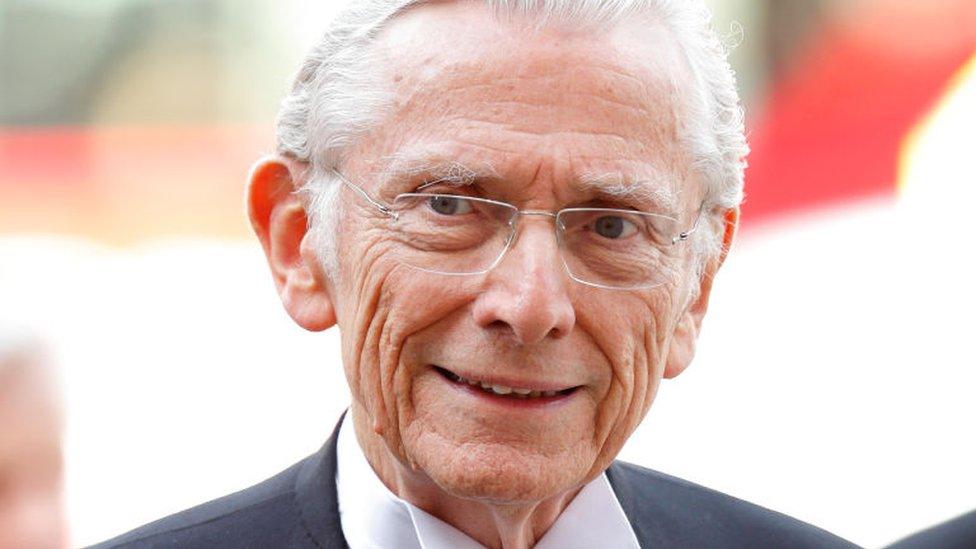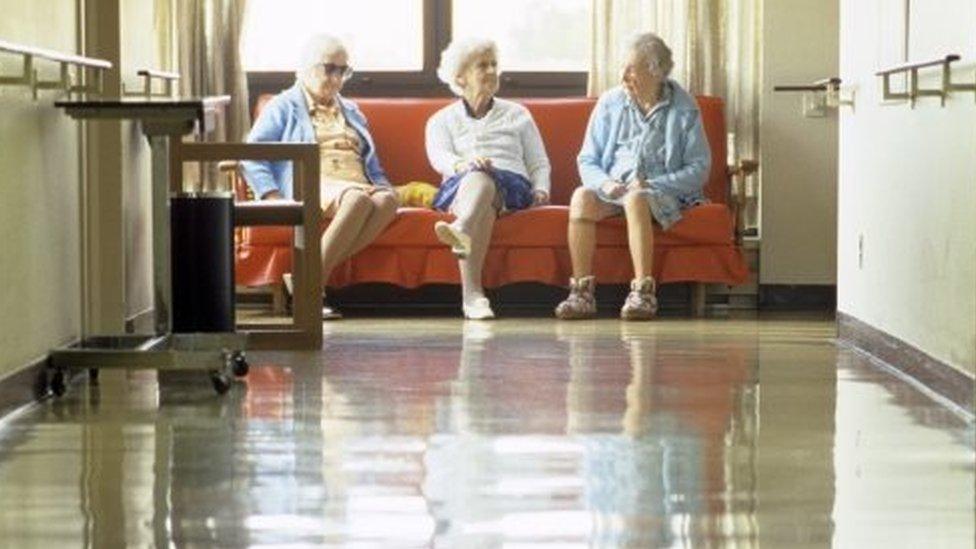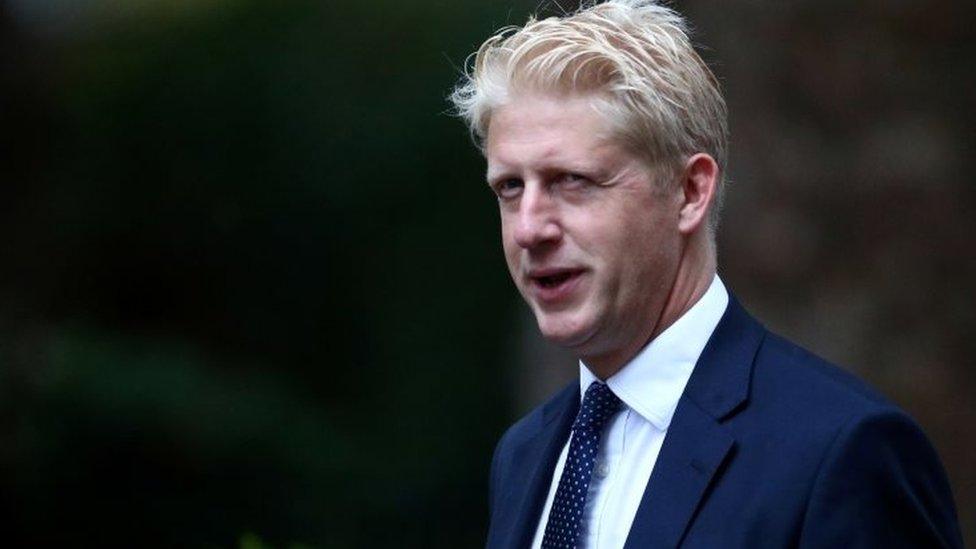The week ahead in Parliament
- Published

Lord Fowler is showing no loss of zest for the Woolsack
It's a Lords-only week in Westminster, as MPs take a half-term break. I suppose this might means some major pandemic or Brexit development resulting in a statement being delivered to the Lords - but, otherwise, the main action will be preliminary sparring over the UK Internal Market Bill (UKIMB for short).
There are two days of committee stage consideration on Monday and Wednesday, but, remember, this is the rather mannered shadow-boxing phase, where peers try to tease out the inner meaning of particular clauses, without ever putting anything to a vote, so that they can return at Report Stage (expected to start on 16 November) with precision-guided amendments to target different aspects of the bill.
The most contentious bit, Part 5, won't be discussed this week, so there will be plenty of foreshadowing, but no actual plot development. At least, not this week.
Rumour reaches me that peers might (gasp!) actually vote on some committee stage amendments on Part 5, the bit with powers to break international law. But they don't expect to reach that part of the bill until the following week.
Even so, Their Lordships' House is seething with life at the moment. So here are five sub-plots to keep an eye on:
Who's next on the Woolsack? after four years as Lord Speaker, Lord Fowler, 82, shows no sign of losing his zest for the job, but some peers do wonder, sotto voce, how much longer he will want to go on. Lord Speakers are elected for a five-year term - and can serve two terms. Inevitably, that means speculation about who's next; former Presiding Officer of the Northern Ireland Assembly, Lord Alderdice, maybe? Or how about the convenor of the crossbenchers, Lord Judge, currently cutting rather a dash over UKIMB?
Time for a cull? There's rising chatter about an attempt to cut the size of the House, by the simplest of means - removal of anyone who hasn't attended for a year. That, after all, is what they do in local government, and maybe, supporters argue, what's good enough for councillors should be good enough for peers.
Non-aligned angst The number of peers who're in a very small party - or not in any party, but don't want to subject themselves to the political neutrality rules which bind actual crossbenchers - has risen sharply in recent years, and have acquired some energetic recruits among recent arrivals. They're beginning to flex their muscles and demand seats on committees and other procedural perquisites.
Partisan zeal detox Some of the non-aligned peers would like to become official crossbenchers, but that entails a series of requirements to eschew, for example, donating to a party. Since many of them have had a lifelong political attachment - mostly ex-Labour MPs who broke with their party over either Brexit or Jeremy Corbyn, or a combination of the two - the devoutly non-partisan crossbenchers are wary. So the new arrivals may be asked to undertake a kind of detoxification period to purge their souls of party politics.
Pack a toothbrush The depth of Lords resistance to UKIMB, laid bare by the huge majority for a "regret motion" against it, suggests not only that peers may vote through extensive amendments, but also that they won't easily drop those amendments if (when!) they're rejected by the government in the Commons. Normally, peers give in gracefully, if the elected house won't accept the changes they've made to legislation, but not always. Memories are beginning to surface of the epic 36-hour Lords sitting in the Blair years, when a bill on house arrest for terror suspects pinged between the Lords and Commons five times, before a compromise was reached. But maybe a deal with the EU will get everyone off the hook.
Here's my rundown of the noble week ahead:
Monday 26 October
The Lords opens (13:00) with the introduction of the former Chancellor Philip Hammond, who takes his seat as Lord Hammond of Runnymede.
Then ministers face 40 minutes of questions starting with the Bishop of London (a former Chief Nurse) asking the government what plans it has to ensure that social and economic inequalities are addressed in their plans for economic recovery from the impact of Covid-19.
Other questions cover supporting cultural and creative industries affected by the pandemic and its impact on disadvantaged pupils. There's also a non-Covid question on whether there has been any increase in take-up of Pension Credit.
Then it's on to the first day of committee stage scrutiny of the UKIMB. Peers expect to spend the first two days discussing its "mutual recognition" provisions, which aim to ensure that the same product can be sold, legally, across all of the UK.
Tuesday 27 October
Peers take their seats (12.00) for questions on government policy on Zimbabwe, support for high street retailers affected by Covid restrictions and protecting victims of domestic abuse
Then peers debate two statutory instruments - first on permitted town and country planning development, with a regret motion from the Lib Dems (the expectation is that this will not be pushed to a vote); and the second a Brexit SI on timber, timber products and forests.
The main legislative action is the detailed committee stage consideration of the the Social Security (Uprating of Benefits) Bill, where the key issues include overseas pensioners who reside in a country with a reciprocal social security arrangement, a report on pensioner poverty in the UK and impact of the act on poverty
There is some committee activity with the EU Security and Justice Sub-Committee (10:00) taking evidence on UK sanctions policy post-Brexit.
Wednesday 28 October
Unusually, there is a Commons select committee sitting during the half-term break - Science and Technology (09:30) will take evidence on UK telecommunications infrastructure and the UK's capability to manufacture its own 5G kit.
The witnesses include former BT executive and trade minister Lord Livingston of Parkhead, now chairman of the government's Telecoms Diversification Taskforce. He will be quizzed on its role and the key aspects of the forthcoming diversification strategy.

Social care reforms are on the agenda
The second panel focuses on Australia's response to banning Huawei two years ago, and the world's first operational OpenRAN network in Japan. Finally, the third panel features Ofcom and the National Cyber Security Centre and the committee will discuss market diversity and telecommunications security in the UK.
The Lords meets (12:00) for questions on the amounts and beneficiaries of money given out from the Clean Growth Fund, the protection of the threatened abuse helpline and the publication of government proposals for the reform of social care.
Then, it's on to day two of committee consideration of UKIMB - this should cover the sections on market access and professional qualification.
The Lords International Relations and Defence Committee (11:00) will take evidence on the UK and Afghanistan
Thursday 29 October

Jo Johnson returns to Parliament after quitting as an MP at last year's election
The Lords day begins (12:00) with the introduction of two more of the new intake of peers; first is Lord Johnson of Marylebone, Jo Johnson, the prime minister's brother and former higher education minister, who will sit as a Conservative (obvs). Then comes Lord Davies of Brixton - Bryn Davies, leader of the Inner London Education Authority in the early 1980s. He will sit as a Labour Peer
Questions range across supporting small businesses during the pandemic, transparency in sources of funding for charities based in the UK and a requirement for civil servants engaged in public procurement to declare any conflict of interest in a public register.
There's an approval motion for a Brexit SI on sanctions, then peers move to committee stage consideration of the Fire Safety Bill - the post Grenfell measure to improve safety in shared buildings like tower blocks by clarifying the responsibility for fire precautions.
The EU Services Sub-Committee (10:00) hears evidence on financial services after Brexit from ex-Eurocrat Sir Jonathan Faull.
Friday 30 October
At the moment there is no business scheduled for Friday, but there are enigmatic hints that the government might put some forward at short notice.
At one point there was a suggestion of a committee stage day on UKIMB - but opposition parties were not keen.
